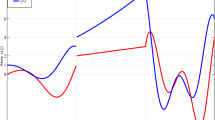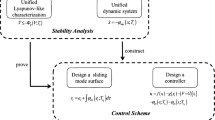Abstract
In this paper, a novel method is presented to study the stability map of linear fractional order systems with multiple delays against uncertainties in delays. It is evident from the literature that the stability question of this class of dynamics has not been resolved yet. The backbone of the new methodology is inspired by an advanced clustering with frequency sweeping technique which enables the exhaustive determination of stability switching curves in the space of the delays. The proposed method detects all the stability regions exactly, in the parametric space of the time delays. An illustrative example is presented to confirm the proposed method results.
Similar content being viewed by others

References
R. Sipahi and I. I. Delice, “Advanced clustering with frequency sweeping methodology for the stability analysis of multiple time-delay systems,” IEEE Trans. on Automatic Control, vol. 56, no. 2, pp. 467–472, 2011.
Y. S. Suh, “Stability of time delay systems using numerical computation of argument principles,” International Journal of Control, Automation, and Systems, vol. 1, no. 1, pp. 127–133, 2003.
K. Gu, S. I. Niculescu, and J. Chen, “On stability crossing curves for general systems with two delays,” J. Math. Anal. Appl., vol. 311, no. 1, pp. 231–253, 2005.
S. Pakzad and M. A. Pakzad, “Stability condition for discrete systems with multiple state delays,” WSEAS Trans. on Systems and Control, vol. 6, no. 11, pp. 417–426, 2011.
N. Ozturk and A. Uraz, “An analysis stability test for a certain class of distributed parameter systems with delays,” IEEE Trans. on Circuits and Systems, vol. 34, no. 4, pp. 393–396, 1985.
C. Bonnet and J. R. Partington, “Analysis of fractional delay systems of retarded and neutral type,” Automatica, vol. 38, no. 7, pp. 1133–1138, 2002.
M. A. Pakzad, S. Pakzad, and M. A. Nekoui, “Stability analysis of time-delayed linear fractional-order systems,” International Journal of Control, Automation, and Systems, vol. 11, no. 3, pp. 519–525, 2013.
S. Pakzad, M. A. Pakzad, and M. A. Nekoui, “Stability map of fractional delay systems in the parametric space of delays and coefficient,” Proc. of American Control Conference, Washington, DC, pp. 176–181, 2013.
K. E. Walton and J. E. Marshal, “Direct method for TDS stability analysis,” IEE Proceeding Part D, vol. 134, pp. 101–107, 1987.
M. A. Pakzad and S. Pakzad, “Stability map of fractional order time-delay systems,” WSEAS Trans. on Systems, vol. 10, no. 11, pp. 541–550, 2012.
Z. V. Rekasius, “A stability test for systems with delays,” Proc. Joint Autom. Control Conf., San Francisco, CA, 1980.
G. E. Collins, “The calculation of multivariate polynomial resultants,” J. Assoc. Comput. Mach., vol. 18, no. 4, pp. 515–532, 1971.
I. M. Gelfand, M. M. Kapranov, and A. V. Zelevinsky, Discriminants, Resultants, and Multidimensional Determinants, Birkhäuser, Boston, MA, 1994.
D. Wang, Elimination Methods, Springer-Verlag, New York, 2001.
W. F. Trench, Introduction to Real Analysis, Pearson Education, Upper Saddle River, 2003.
V. B. Kolmanovskii and V. R. Nosov, Stability of Functional Differential Equations, Academic Press, London, 1989.
D. Zheng, Z.-Y. Ren, and J.-A. Fang, “On stabilizing sets of PI controllers for multiple time delayed process,” Journal of Donghua University (English Edition), vol. 26, no. 1, pp. 36–39, 2009.
Author information
Authors and Affiliations
Corresponding author
Additional information
Recommended by Associate Editor Young Soo Suh under the direction of Editor Hyungbo Shim.
Mohammad Ali Pakzad was born in Tehran, Iran on September 1981. He received his B.S. degree in Electronics Engineering from Karaj Branch, Islamic Azad University, Iran in 2005, an M.Sc. degree in Control Engineering from Science and Research Branch, Islamic Azad University, Tehran, Iran in 2009. His research interests include stability analysis of time-delayed systems, control systems theory, fractional order systems and model predictive control.
Mohammad Ali Nekoui was born in December 1952. He received his M.Sc. degree in Electrical Engineering from the University of Tehran in 1976, and his Ph.D. degree at the School of Electrical and Electronic Engineering in Computer and Control Department from University of Leeds, U.K. in 1997. Since 1980, he has been with the K.N.T. University of Technology. At present he is an Assistant Professor at the Faculty of Electrical and Computer Engineering of this university. His interest includes linear and nonlinear optimization, linear systems, optimal control, and different aspects of mathematics in control.
Rights and permissions
About this article
Cite this article
Pakzad, M.A., Nekoui, M.A. Stability map of multiple time delayed fractional order systems. Int. J. Control Autom. Syst. 12, 37–43 (2014). https://doi.org/10.1007/s12555-012-0481-7
Received:
Revised:
Accepted:
Published:
Issue Date:
DOI: https://doi.org/10.1007/s12555-012-0481-7



